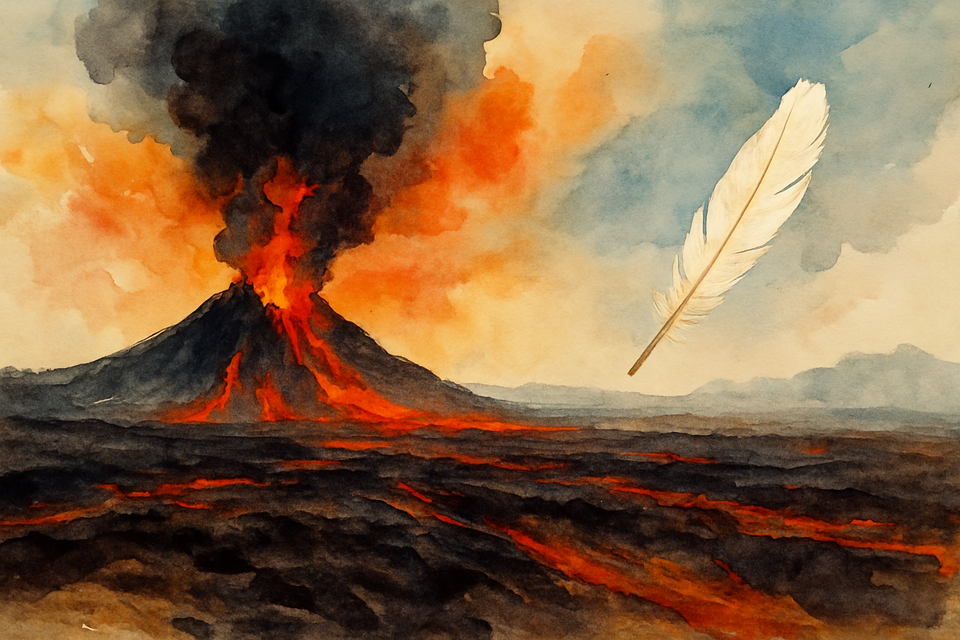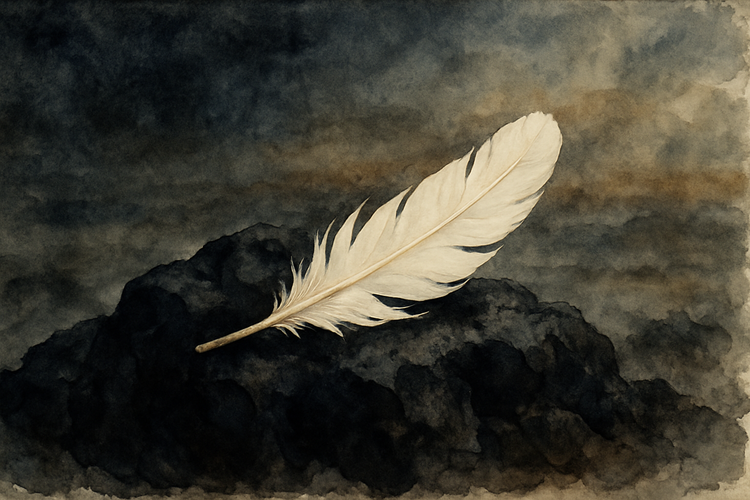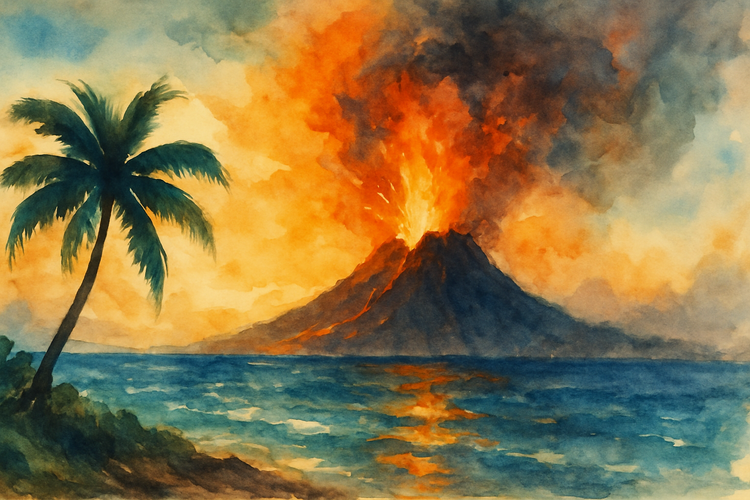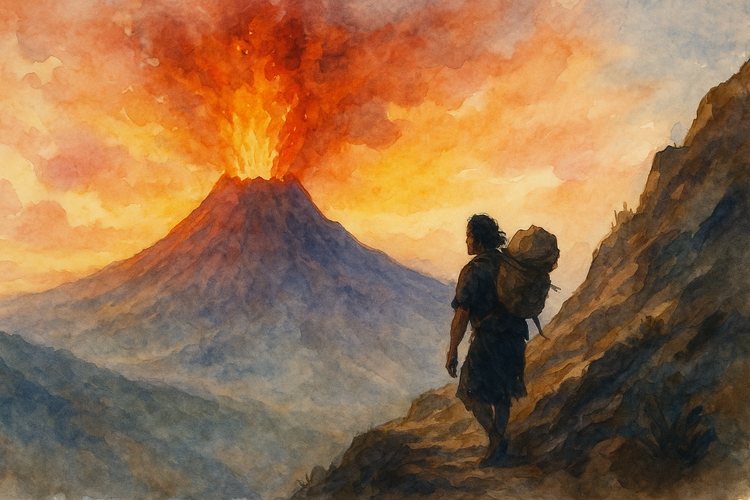Chief of War S1E9 "The Black Desert"

Spoiler Warning: This reflection reveals events from the ninth episode of Chief of War.
Where the Story Should Have Ended
The Black Desert closes Chief of War not with resolution but with rupture. From the outset it was billed as a limited series, a story with a contained arc. That makes the finale’s choice all the more puzzling. Rather than drawing its threads together, it leans on the possibility of another season, leaving this ordered run without real closure.
The brutality rises from the opening scenes. Keōua, unsteady and haunted by visions, forces one of his chiefs to break his own teeth — a grotesque ritual of submission that sets the tone. On O'ahu, Kahekili sits in judgment beside his son, summoning the young man’s friend accused of conspiracy. Before his son’s eyes he has the friend strung up, relenting only when his son pleads for mercy. It is not justice, nor strategy, but spectacle — a father flaunting power by turning mercy itself into theater.
From there the episode continues to climb. Armies pledge themselves in rites meant to appear sacred but that play as hollow. Ka'iana is named chief of war under Kamehameha and dressed in regalia. Ka'ahumanu is elevated to the council. Soon the stage is set — black lava stretching to the horizon, armies gathering, prophecy invoked. It could feel mythic. Instead, each escalation edges toward excess.
A Forgiveness Too Quiet for War
Amid the noise, Ka'iana’s forgiveness of his brother stands out for its restraint. The confession is raw: the affair with Kupuohi, the enduring love, the shame carried since. In most stories such a revelation would ignite. Here, Ka'iana listens quietly, almost detached, as though there is nothing to forgive. His brother’s choice was not born of malice but of absence — a wound opened by Ka'iana’s presumed death.
Placed against the grotesque penances and executions surrounding it, this moment lands like a whisper. Where Keōua mutilates followers and Kahekili toys with execution, Ka'iana reframes betrayal as loss and answers with grace. It recalls his climb in The Sacred Niu Grove (S1E8), when he lashed his brother’s bones to his back and carried them up the mountain. In both moments, Ka'iana meets grief and betrayal not with vengeance but with acceptance — a reminder that the quietest gestures can carry the most weight.
When Omens Become Stagecraft
Throughout the season, prophecy was left ambiguous — visions clouded, gods silent, seers uncertain. In the finale, that ambiguity collapses. Warriors gather before the idol of the war god. A feather loosens and drifts down, settling on Ka'iana. It is filmed as revelation: clear sign that he is chosen.
But it comes too late, and too blunt. Ka'iana himself has confessed to Kupuohi that beyond Hawai'i he has seen violence emptied of sanctity, cruelty stripped of prayer. A feather falling cannot erase that truth. The council may see destiny, but for the audience it feels like stagecraft — spectacle mistaken for meaning.
It echoes back to The Splintered Paddle (S1E6), when Kaʻiana first doubted whether faith belonged to gods or to guns. Then, silence left room for human law. And it stands apart from Day of Spilled Brains (S1E7), when Taula convulsed on the shoreline as cannon fire tore through villages — prophecy unsettled, hinting at forces too large to master. Here, prophecy contracts into blunt theatrics, the gods reduced to feather and fissure.
The Black Desert Battle
The black desert itself ought to have been the series’ natural climax. The cooled lava fields stretch to the horizon like a stage carved by the gods. Chiefs taunt one another across the expanse. Armies gather in impossible numbers, muskets glinting beside spears. For a moment, the framing promises culmination — years of ambition and prophecy converging.
But the battle plays as blur. Muskets thunder, bodies collapse in waves, violence stacking image upon image until it loses shape. A few moments flicker — Kupuohi’s sister striking down the lunatic chief, vengeance swift and brutal; Kupuohi herself gravely wounded, her fall framed as mortal. They might have anchored the chaos, but the camera moves past them. They are swept into the churn.
Then the land itself ruptures. The ground opens, swallowing soldiers whole. What aims to be divine spectacle lands as excess. For a show that once treated prophecy as silence and vision as doubt, it feels like a break in tone. Instead of Shakespearean tragedy edged with myth, the battle veers into disaster cinema, deus ex machina so literal it unsettles all that came before.
Fragments After the Fire
In the aftermath, there are gestures toward intimacy. Ka'ahumanu moves to Ka'iana, helping him rise from the wreckage. The moment is filmed with tenderness, her hand on his shoulder carrying both loyalty and unspoken affection. In another telling, this might have served as culmination — the slow drift of loyalty into something deeper. Here, buried in incoherence, it feels more like one thread among many left untied.
And then the coda. Kahekili, deep in madness, presides over an orgy. Midseason, it might have registered as portrait of a king dissolving into decadence. As the series’ final image, it is jarring: indulgence where resolution might have been. The run ends not in closure but in provocation, leaning on the hope of continuation rather than delivering on its own terms. Even with renewal, this will remain a misstep in storytelling.
What Remains
Looking back, The Black Desert makes earlier episodes feel like they belonged to another show. For weeks, Chief of War staged prophecy as silence, law as fragile experiment, loyalty as both wound and gift. It gave us images with tragic weight: Kamehameha teaching children to plant taro, Ka'ahumanu burdened with the prophecy of barrenness, Ka'iana strapping his brother’s bones to his back. These moments endure because they trusted the human scale of history.
The finale chose another path. It gave us earthquakes, massacres, and decadence, mistaking spectacle for resolution. Whether or not a second season appears, this will remain the fracture point — a finale that reached for triumph but fell into collapse. The series that began as tragedy ended in pulp, a reminder of how fragile tone can be, and how quickly coherence can be lost to noise.



Comments ()